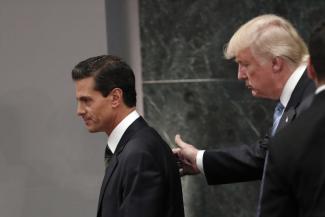USA – Mexico
The fence is already up

There are different definitions of the term “populism”. It is used in conjunction with far-right politicians who contest the legitimacy of all other parties, but it also refers to politicians who see themselves as representatives of people at the bottom of the ladder, like workers and farmers. “Populism” has positive associations when seen from that standpoint, which is widespread in America.
The difference between the two understandings of the term became evident at the summit of North American leaders that was held in Canada in June 2016. Mexican President Enrique Peña Nieto condemned all governance by demagogues and populists – whereas US President Barack Obama characterised himself as a populist. Obama meant that he wants to see his social policies realised, while Peña Nieto was referring to the way authoritarian politicians gain popularity and seize power by exploiting popular fears and making impossible promises. In contrast, serious leaders spell out precisely how they intend to reach their goals.
The Mexican president made his own impossible promises during his campaign, however. In addition to a profuse promotion of his image in the media, he capitalised on the growing insecurity and violence that have been caused by the drug war and promised to deliver stability, which he has not yet been able to do (see box).
In any case, the rise of Donald Trump in the US is also a textbook example of manipulative, right-wing populism. The candidate seized on people’s fears and used slogans to stoke xenophobia and hatred of minorities. He did not support his grandiose promise to “make America great again” with specific plans that could be directly implemented. He flatly asserted that the US takes precedence over all other countries and should take care of its own interests first of all. The media did not hesitate to use the populist label for Trump, who was repeatedly caught lying.
The Spanish-language CNN even spoke of the “Latin Americanisation of the United States”. The news outlet was suggesting that only people with little knowledge of politics could fall for the rhetoric of a strongman who pretends to be the voice of the people but clearly represents the interests of the rich.
Paul Krugman was thinking along the same lines when he wrote in The New York Times that Trump would turn America into a “stan”. Krugman argues that just like in Tajikistan, Kyrgystan or Turkmenistan, Trump mixes public office and private business. According to the columnist, nepotism, clientelism and corruption are about to experience a renaissance in the USA.
Such criticism is not baseless. Contrary to democratic convention in the US, Trump never released his tax returns. As a result, little is known about his international business interests. He initially promised to release the returns during the campaign, but never did. Later he announced that he would explain at a press conference in December his plans to turn his business dealings over to his sons in a way that would avoid potential conflicts of interest, but the event was cancelled. When he finally did discuss the matter in public in January, many important issues were not resolved. He wants people to trust his word that he has no business ties with Russia.
In the meantime, it has emerged that the construction permit for a new Trump Tower in Buenos Aires was issued shortly after the election winner had a telephone conversation with Mauricio Macri, Argentina’s president. Such information raises questions – and not only in Latin America. Maybe Macri did not exert any influence, maybe he simply wanted to be on good terms with Washington – or maybe there was even a bribe.
Some Mexicans find US election law undemocratic, given that it allowed Trump to win the election with 46 % of the votes, whereas his opponent Hillary Clinton received 48 %. Analysts have explained to the people how the US elections work, pointing out that the system is different, but not undemocratic. The general feeling is that the USA is a better organised society, so its citizens can trust government institutions. Mexicans distrust theirs, but the gap between the two countries may become smaller under President Trump.
The list of people that Trump wants to bear responsibility in his cabinet shows that he clearly represents the interests of the wealthy elite. Many voters are now realising with disappointment that the candidate simply used them to get elected. Many of them are likely to lose their health insurance. Trump’s party wants to repeal Obamacare, and Trump’s promise to replace his predecessor’s health-care reforms with something better will certainly prove empty. Trump has presented himself as a strong man who can improve the economic and security situation of his country. But his proposed actions will not benefit the people who are most in need of support and solidarity. On the contrary, Trump has unleashed a wave of hostility and open aggression towards them.
During the campaign, Trump promised lower taxes – particularly for the super-rich – and tax relief for corporations, which would go along with weaker environmental law. According to his logic, all of society will benefit if the private sector can operate and make profits with as few limitations as possible. He wants people to believe that everything will be better if he can govern the country like the CEO of a corporation without having to listen to any dissenting opinions.
Walling out migrants
An important part of Trump’s campaign was his promise to build a wall along the border with Mexico. Its design changed several times. The “huge wall” became a fence, and later “a huge wall with a big beautiful door”. But there is no doubt that he meant these threats seriously. The question now is whether his plan can be realised and how he wants to fulfil his promise to make Mexico pay for it. His ideas range from exerting economic pressure on the neighbouring country to confiscating remittances migrant workers send home to all-out war.
He does not take into account that not only Mexicans cross the border into the US. Migrants from all over Central and South America do. Last year, for instance, thousands of Haitians arrived in border cities like Tijuana. A wall in the southern USA would only push the problem to the other side of the border.
President Peña Nieto invited Trump to Mexico in the summer. He embarrassed himself in the process. Peña Nieto said that he wanted to build trust in case Trump was elected. However, the visit further damaged the already tarnished image of his administration, since Trump, as soon as he was back in USA, continued to talk about the wall and call international trade agreements into question.
Trump’s rise has fuelled outrage in Mexico. Jokes and caricatures of the candidate circulated on the web. Trump-shaped piñatas were sold at markets (piñatas are papier mâché figures filled with candy that children break open at parties). The fun ended when President Peña Nieto appointed Luis Videgaray as foreign minister. Videgaray organised Trump’s visit, and most analysts regard him as a pawn in Trump’s game.
From the Mexican standpoint, much is at stake: jobs, investments, migrants’ remittances and perhaps even mass deportation from the neighbouring country. Mexico’s economy is geared to the North American Free Trade Agreement (NAFTA), which the US and Canada have signed to. Trump criticised NAFTA many times in the campaign. He wants to renegotiate it and has made it perfectly clear that he is only interested in advancing US interests, but not in interacting as equals.
On the one hand, Trump says he loves Mexico and its people, but on the other he says that Mexico has taken unfair advantage of NAFTA. He has started bullying multinational corporations to keep them from investing in Mexico. Ford caved in and announced it was cancelling Mexican projects in view of possibly rising taxes. In response, some Mexican institutions have stopped their commercial relationship with Ford. Trump has been putting pressure on other corporations as well, including Toyota and BMW. US-Mexican trade amounts to about $ 500 billion per year. Companies and employment depend on it on both sides of the border. What Trump has said on the campaign trail and during the transition shows that he intends to be disruptive and insist on getting his way. Mexican authorities, however, still talk about building bridges, as if diplomacy as usual was still possible.
NAFTA has critics in Mexico too. In the maquiladoras, the industrial areas that sprang up along the border following the conclusion of the agreement, the working conditions are tough. Nonetheless, many people find employment and income here. Mexicans believe that better jobs are needed in the maquiladoras – but not fewer employment opportunities.
Since the election, various political parties in Mexico have championed solidarity with Mexicans in the United States. But these are just empty slogans. Mexicans know very well that their politicians cannot protect them even in their own country. They also know that there were numerous deportations under President Barack Obama, which however were very rarely discussed.
Peña Nieto insists that Mexico will not pay for the wall. He has said he wants the flow of illegal weapons to stop from north of the border. He has also indicated interest in a trade agreement with the EU, so Mexico would not depend on its North American neighbours so much anymore. His position is weak, however. When this essay was finalised before Trump’s inauguration, the peso had depreciated and inflation was rising accordingly. The worse things get, the more people will want to move to the USA. Trump’s grandstanding may thus well have unintended effects.
In all the excitement, it is often forgotten that there is a physical fence along the border already. It was built when Bill Clinton was president, and it spans those parts of the border where the inhospital desert doesn’t serve as a natural wall anyway. The fence is patrolled not only by official border agents, but also by right-wing militia groups. Perhaps even worse is the ideological and cultural fence that has stood between the two countries at least since the results of the US election were counted. The choruses of “build that wall” have seriously damaged the Mexican notion of an American “friend”.
Virginia Mercado is a researcher at the Universidad Autónoma del Estado de México and an instructor in peace and development studies.
virmercado@yahoo.com.mx










